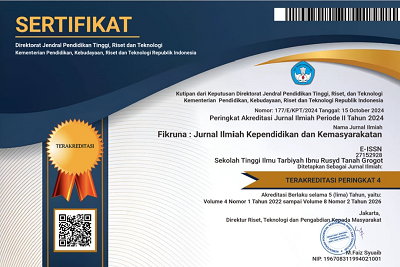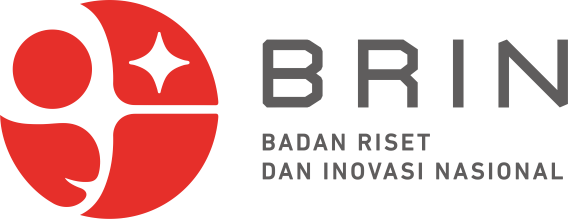LEVERAGING ISLAMIC EDUCATION FOR SUSTAINABLE CHARACTER DEVELOPMENT TO AIMED FUTURE
Abstract
This study aims to explore the implementation of character education based on Islamic values in elementary schools, focusing on the strategy of integrating these values in the educational process. This research is based on the importance of character education that is in line with Islamic teachings in forming a generation with noble character. The research method used is a qualitative approach with a case study type, involving the principal, deputy principal for curriculum, teachers, and students as the main informants. Data was collected through observation, in-depth interviews, and documentation, then analyzed using the Miles and Huberman model, which included data reduction, data presentation, and verification. The results of the study show that Islamic values are integrated into the curriculum, applied through active and participatory learning methods, supported by routine religious activities, and strengthened by the example of teachers and staff. Cooperation with parents also plays an important role in ensuring the consistency of character education at home and school. The results of this research lie in the provision of a model for the implementation of character education based on Islamic values that can be a reference for other schools in an effort to build a generation with strong character and noble character.
References
Arif, A. M., Nurdin, N., & Elya, E. (2023). Character Education Management at Islamic Grassroot Education: The Integration of Local Social and Wisdom Values. Al-Tanzim: Jurnal Manajemen Pendidikan Islam, 7(2), 435�450.
Arifin, S. (2024). Management of Ahlussunnah wal Jama�ah-Based Curriculum Development in Islamic Education Best Practice. Educazione: Journal of Education and Learning, 1(2), 102�115.
Aswie, V., & Amarulloh, R. R. (2024). Internalization of Sundanese Local Wisdom in Strengthening the Profile of Pancasila Students through the Literacy Movement in Madrasah. JENTRE, 5(1), 17�27.
Ataman, A., Baharun, H., & Safitri, S. D. (2024). Exploring Complementary Leadership Styles in Madrasahs by Aiming at Their Impact on Integrity and Character Development. Business and Applied Management Journal, 1(2), 118�133.
Atmaja, T. S. (2023). The Urgency Of Character Education In Educational Units In Indonesia In Facing Global Challenges And 21st Century Competencies. Jurnal Scientia, 12(04), 2014�2019.
Boty, M., Dardiri, A., Sunarso, Setiawan, J., & Fadli, M. R. (2023). The Values of Struggle Character Education K.H. Ahmad Hanafiah and its Implementation in Local History learning. Pegem Egitim ve Ogretim Dergisi, 13(2), 62�71. https://doi.org/10.47750/pegegog.13.02.08
Chao, Y.-L. (2023). General Education Courses Integrated With Character Development Activities: Effectiveness on the Character Development of University Students. Problems of Education in the 21st Century, 81(5), 586�597. https://doi.org/10.33225/pec/23.81.586
Faiz, H., Al-Amin, M. F., Mundiri, A., & Fahmi, A. (2023). Transforming Organizational Quality Through Effective Administrative Training. Communautaire: Journal of Community Service, 2(2), 157�167.
Hafizi, M. Z., & Wiyono, H. (2023). The Importance Of Moral Education In The Formation Of Children�s Character. IJGIE (International Journal of Graduate of Islamic Education), 4(2), 345�350.
Hariyadi, A., Jenuri, J., Darmawan, D., Suwarma, D. M., & Pramono, S. A. (2023). Building of the Pancasila Character with Religious Harmony in the Globalization Era. AL-ISHLAH: Jurnal Pendidikan, 15(2), 2126�2133.
Harmadi, M. B. R., Adiguna, A. J., Putri, D. C. S., Banuati, N., Pambudi, A. L., & Broto, L. S. W. (2022). Moral education and social attitudes of the young generation: Challenges for Indonesia and the international community. Jurnal Panjar: Pengabdian Bidang Pembelajaran, 4(2), 173�222.
Hart, P. (2022). Reinventing character education: the potential for participatory character education using MacIntyre�s ethics. Journal of Curriculum Studies, 54(4), 486�500.
Ilyas, J., Fathurahman, A. A., & Salsabila, I. (2024). The Importance of Islamic Religious Education in Building the Superior Character of the Younger Generation. Zona Education Indonesia, 2(2), 339�346.
Indawati, N., Kartiko, A., Suyitno Suyitno, A. S., & Fuad, Z. (2022). Improving The Religious Character of Educators Through Exemplary of Principles. AL-TANZIM: Jurnal Manajemen Pendidikan Islam, 6(3), 789�801.
Istiyono, E., Kartowagiran, B., Retnawati, H., Cahyo Adi Kistoro, H., & Putranta, H. (2021). Effective Teachers� Personality in Strengthening Character Education. International Journal of Evaluation and Research in Education, 10(2), 512�521.
Khotimah, H., Manshur, U., Zaini, A. W., & Suhermanto, S. (2024). INCREASING THE COMPETENCE OF ISLAMIC RELIGIOUS EDUCATION TEACHERS FROM A MADRASAH-BASED MANAGEMENT PERSPECTIVE. Managere: Indonesian Journal of Educational Management, 6(1), 13�26.
K�hler, T. (2024). Multilevel qualitative research: Insights from practice. European Management Journal, March 2023. https://doi.org/10.1016/j.emj.2024.03.011
Kurnanto, M. E., Sumin, S., Zuchdi, D., & Asmawi, S. (2023). Building Religious Character through Suluk on Multiethnic Students of Thariqah Al-Mu�min Community in West Kalimantan. Dinamika Ilmu: Journal of Education, 23(1), 135�156.
Muhammad, I., Ariani, S., & Yusuf, M. (2021). Balinese Muslim Minority Rights in Education and Islamic Family Law. Samarah, 5(2), 804�824. https://doi.org/10.22373/sjhk.v5i2.9108
Pramono, K., & Hanita, M. (2021). Strategy for Strengthening Nation Character Building in Facing the Challenges of the Information Age. Journal of Strategic and Global Studies, 4(1), 11.
Purwanto, A., & Wafa, A. (2023). Interpersonal Communication Strategies in Building an Image of Contigency Perspective of Accommodation. Managere: Indonesian Journal of Educational Management, 5(3), 267�279.
Rahmatullah, A. S., Mulyasa, E., Syahrani, S., Pongpalilu, F., & Putri, R. E. (2022). Digital era 4.0: The contribution to education and student psychology. Linguistics and Culture Review, 6(S3), 89�107.
Rasyidi, A. H., & Al Idrus, S. A. J. (2024). Exploration of PAI Teacher Challenges and Opportunities; Case Study of Implementation The Independent Learning Curriculum, In East Lombok Elementary Schools. Jurnal Ilmiah Profesi Pendidikan, 9(1), 506�514.
Ridlo, M. H., & Yanti, L. S. (2023). INVESTIGATING THE HOLISTIC MANAGEMENT IN INCREASING GRADUATES�COMPETENCE IN MADRASA BASED ON PESANTREN. PEDAGOGIK: Jurnal Pendidikan, 10(2), 226�239.
Safitri, S. D. (2024). Character Management in Crisis: Implementation of Five Day in Ma�had as a Social Care Solution in Elementary Madrasah. JUMPA: Jurnal Manajemen Pendidikan, 5(1), 57�68.
Saharani, L., Sanjani, M. A. F., & Diana, S. (2024). OPTIMIZATION OF ISLAMIC VALUES-BASED PUBLIC RELATIONS STRATEGY IN INCREASING NEW STUDENT ADMISSIONS. Managere: Indonesian Journal of Educational Management, 6(2), 194�206.
Sakban, A., & Sundawa, D. (2023). Character Education: Direction and Priority for National Character Development in Indonesia. Jurnal Kependidikan: Jurnal Hasil Penelitian Dan Kajian Kepustakaan Di Bidang Pendidikan, Pengajaran Dan Pembelajaran, 9(3), 794�807.
Sanjani, M. A. F. (2024). The Impact of School Principals on Graduate Quality Through Character Education Initiatives. Journal of Educational Management Research, 3(1), 30�46.
Sanjani, M. A. F., Islamiah, R., & Maulidiah, L. (2024). Building Strong Foundations, Educational Management�s Contribution To Character Education And Graduate Quality Enhancement. Ar-Rosikhun: Jurnal Manajemen Pendidikan Islam, 3(3), 244�257.
Snyman, C., Van Eeden, C., & Heyns, M. (2023). How character strengths of autistic learners aid primary school educators in the class: An exploratory study. South African Journal of Childhood Education, 13(1), 1�12. https://doi.org/10.4102/sajce.v13i1.1311
Sodikin, O., Wasliman, I., Sauri, S., & Sauri, R. S. (2022). Implementation of Integrated Quality Management Private Character Education in Improving Discipline of Students. IJGIE (International Journal of Graduate of Islamic Education), 3(1), 120�134.
Supadi, S., & Fauzi, F. (2024). Implementation Strategies of the Independent Learning Curriculum in Achieving Character Education Competencies in Islamic Religious Education at School. Asian Journal of Healthy and Science, 3(9), 243�255.
Tuala, R. P., Yetri, Septur, Apriliani, I., Alamsyah, Y. A., & Putra, P. A. (2024). Environtmental Management Based on Socio Religious (Case Study of Student Behaviour in UIN Raden Intan Lampung). In E3S Web of Conferences (Vol. 482). https://doi.org/10.1051/e3sconf/202448204027
Ulum, B., & Syafi�i, I. (2022). Implementing Contextual Teaching and Learning Models in Islamic Religious Education Learning. Academicus: Journal of Teaching and Learning, 1(1), 45�53.
Vhalery, R. (2024). Pancasila-Based Character Education in the Society 5.0 Era: A Systematic Literature Study. JOURNAL OF EDUCATION: DEVELOPMENT AND REVIEW (JEDAR), 1(1), 46�53.
Williams, H. (2021). The meaning of �Phenomenology�: Qualitative and philosophical phenomenological research methods. The Qualitative Report, 26(2), 366�385.
Yulianti, K., Denessen, E., Droop, M., & Veerman, G.-J. (2022). School efforts to promote parental involvement: the contributions of school leaders and teachers. Educational Studies, 48(1), 98�113.
Yumnah, S. (2021). Character Education with Islamic Insights of The Nusantara. Nazhruna: Jurnal Pendidikan Islam, 4(3), 547�562.
Zaini, A. W. (2023). Improving Islamic Religious Education Teachers� Performance Through Effective School Leadership. AFKARINA: Jurnal Pendidikan Agama Islam, 8(1), 12�24.
Zuhdi, Z., Faridy, F., Hefny, H., & Fahmi, M. A. (2024). Enhancing Learning Quality through Management Support in Crafting Self-Assessment Questions at School. Communautaire: Journal of Community Service, 3(1), 1�12.
Copyright (c) 2024 Ahmad Alfi Nur Syadzali

This work is licensed under a Creative Commons Attribution-NonCommercial 4.0 International License.



.png)












